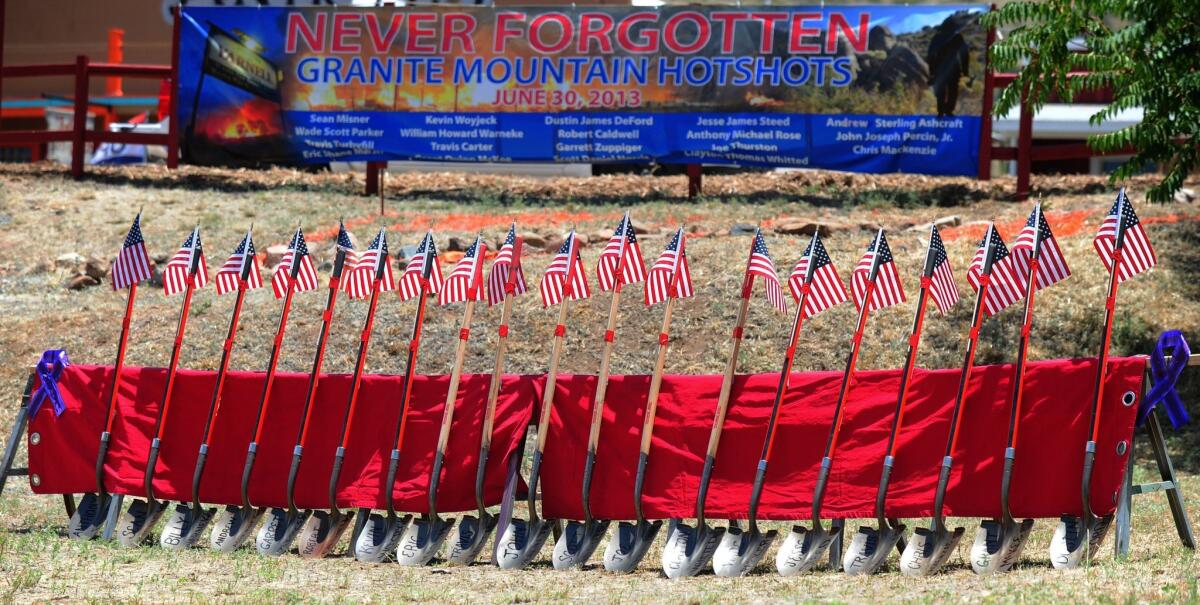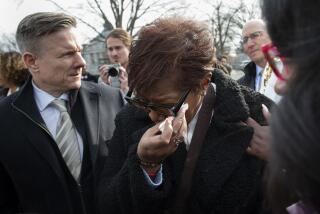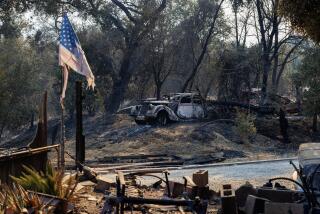Families of Yarnell Hill firefighters settle legal claims with state

Flag-topped shovels with the names of the Granite Mountain Hotshots on their blades were a grim reminder of the tragedy that occurred two years ago as residents gathered June 28 for the Remembrance Event of the 2nd anniversary of the Yarnell Hill Fire in Arizona. Nineteen firefighters died on June 30, 2013, when the men were overrun by flames in a brush-choked canyon.
Reporting from Tucson — The families of 12 men killed in one of the deadliest wildfires in the nation’s history have reached a settlement with the state of Arizona, ending a strained yearlong negotiation that divided the town of Prescott and raised questions about training and how the state fights fires.
The families of 12 of the 19 Granite Mountain Interagency Hotshot Crew members settled for $50,000 each, according to a copy of the settlement agreement. The agreement was announced Monday, one day before the second anniversary of the deaths.
A workplace lawsuit also announced Monday will ensure the families of the other seven firefighters killed on June 28, 2013, will receive $10,000 each from the Arizona State Forestry Division.
In addition to the financial settlements, the Forestry Division also agreed to make improvements in how it manages fires, including overhauling its radio communication efforts.
The Forestry Division also pledged to encourage the National Wildfire Coordination Group, a federal interagency firefighting group, to create a course that addresses “the reality of death,” and instructs firefighters to make estate planning and custody arrangements.
Roxanne Warneke visited Yarnell Hill, where her husband, Billy, and his crew were overtaken by a quick-turning brush fire. The visit was troubling, Warneke said, because her husband would not have chosen to descend into a deep, brush-filled valley unless he was ordered to.
“Descending into that canyon went against everything he was taught,” Warneke said at a televised news conference on Monday in Phoenix. “After that day, I knew I needed answers.”
A common complaint from families of the dead Hotshots was that state officials did not fully explain what caused the tragedy and whether it could have been avoided. The Forestry Division agreed that when all litigation concludes, including appeals, it will have an eight-hour meeting with the families and consultants to review information about the fire and answer questions, with lawyers present.
In 2013 a report prepared by local, state and federal investigators said that several factors contributed to the tragedy, such as wind, terrain and the firefighters’ movements. It did not pinpoint one factor as the leading cause of the deaths. It pointed out management lapses but found no evidence of recklessness or negligence.
That same year, the Arizona Division of Occupational Safety and Health leveled two citations against the Forestry Division, proposing more than $500,000 in fines for failing to provide a safe work environment by ignoring changing weather patterns and fire behavior.
The Forestry Division specified in the settlement that it was not admitting to either citation and refuted all allegations of wrongdoing.
Administrative Law Judge Michael Mosesso approved the settlement on Thursday. The settlement was another victory to the families of the firefighters killed on duty, following a decision by the city of Prescott’s retirement board last year to award enhanced benefits to the families of the 12 members of the Granite Mountain Hotshots who worked on a seasonal basis, and were initially denied the benefits accorded to full-time employees.
Arizona Atty. Gen. Mark Brnovich was adamant Monday that the state admitted no fault, but said the settlement fixed a problem without assigning blame.
“We don’t measure our success in wins and losses. We are not State Farm, we are the state of Arizona,” Brnovich said. “Some folks look for answers, some look for fights. We wanted to look for answers.”
Attorney Patrick McGroder, who represented the families in their suit against the state, called the negotiations “grueling,” and the years leading up to the settlement wore on family members of the firefighters, especially the 12 who were originally classified as seasonal workers.
Almost immediately after the fire, in August 2013, Prescott Mayor Marlin Kuykendall told the Daily Courier in a meeting meant to explain the city’s position that the families of the firefighters originally considered seasonal workers were after money.
“She’s a neat little lady ... but money took hold in this situation real fast,” Kuykendall said about Juliann Ashcraft, wife of crew member Andrew Ashcraft. “This is big bucks when it’s all over, big bucks. And money seems to be leading some of the battle over the city’s participation.”
McGroder on Monday said the settlement would help ensure fewer firefighters die in the future.
“For the families, I hope this settlement can achieve a modicum of peace,” McGroder said. “Through this settlement, the legacy of their loved ones will never be forgotten.”
Follow @nigelduara on Twitter.
More to Read
Sign up for Essential California
The most important California stories and recommendations in your inbox every morning.
You may occasionally receive promotional content from the Los Angeles Times.











